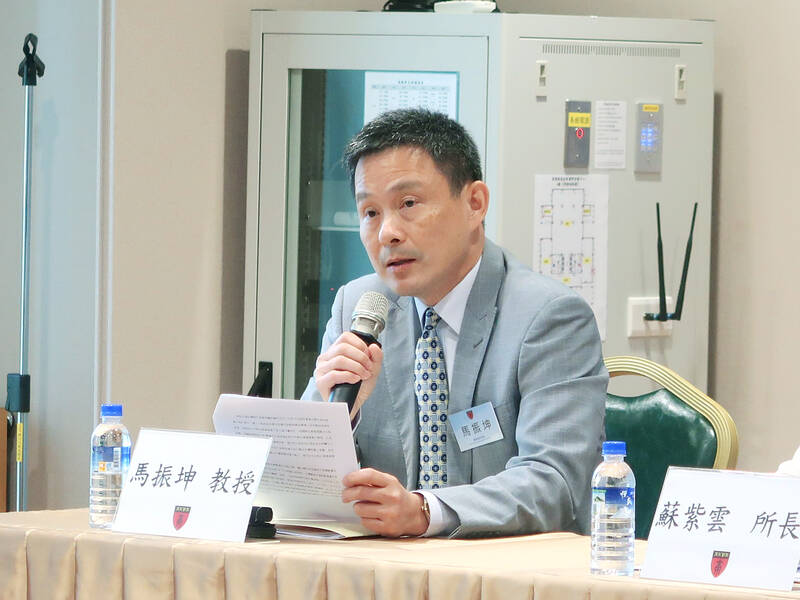China intends to flout established flight routes and treat airspace over the Taiwan Strait as its own, a researcher said on Monday, after a Chinese civilian aircraft flew over Kinmen County last month.
China Eastern Airlines Flight MU-505 from Shanghai to Hong Kong on April 29 deviated from flight route M503 — which follows China’s coastline and then travels through international waters in the Taiwan Strait — and crossed directly over Kinmen County toward China.
The Chinese Civil Aviation Administration said the flight deviated to avoid inclement weather.

Photo: Chen Yu-fu, Taipei Times
However, the flight had already passed the periphery of the thunderstorm when it deviated toward Kinmen, National Defense University researcher Ma Chen-kun (馬振坤) said, adding that Chinese air traffic control instructed the flight to make the deviation.
Ma made the remarks on Monday at a seminar discussing the outcome of this year’s G7 summit held from Friday to Sunday in Hiroshima.
Under a cross-strait agreement, in the event of inclement weather flights on route M503 normally redirect toward airspace over China before reaching Kinmen, and do not return to the normal flight path until they reach the boundary between China’s Fujian and Guangdong provinces, roughly 200km south of Kinmen, he said.
Beijing has been normalizing military exercises in the Taiwan Strait, and is likely to find excuses to increase inspections of Taiwanese vessels in a bid to expand its maritime jurisdiction, he said.
“This is all part of the gray zone tactics that China has been employing in recent years, which are aimed at reducing the vigilance of Taiwan’s military, and of US forces stationed in Okinawa,” said Kuo Yu-jen (郭育仁), a professor at National Sun Yat-sen University’s Institute of China and Asia-Pacific Studies.
“You can see this in the way China has been blurring the lines between military exercises and mobilization,” Kuo said.
The approach would erode the early warning window ahead of a full-scale Chinese assault on Taiwan, and local forces could find themselves overwhelmed in the event of a surprise attack, he said.

Chinese Nationalist Party (KMT) Chairman Eric Chu (朱立倫), spokeswoman Yang Chih-yu (楊智伃) and Legislator Hsieh Lung-chieh (謝龍介) would be summoned by police for questioning for leading an illegal assembly on Thursday evening last week, Minister of the Interior Liu Shyh-fang (劉世芳) said today. The three KMT officials led an assembly outside the Taipei City Prosecutors’ Office, a restricted area where public assembly is not allowed, protesting the questioning of several KMT staff and searches of KMT headquarters and offices in a recall petition forgery case. Chu, Yang and Hsieh are all suspected of contravening the Assembly and Parade Act (集會遊行法) by holding

PRAISE: Japanese visitor Takashi Kubota said the Taiwanese temple architecture images showcased in the AI Art Gallery were the most impressive displays he saw Taiwan does not have an official pavilion at the World Expo in Osaka, Japan, because of its diplomatic predicament, but the government-backed Tech World pavilion is drawing interest with its unique recreations of works by Taiwanese artists. The pavilion features an artificial intelligence (AI)-based art gallery showcasing works of famous Taiwanese artists from the Japanese colonial period using innovative technologies. Among its main simulated displays are Eastern gouache paintings by Chen Chin (陳進), Lin Yu-shan (林玉山) and Kuo Hsueh-hu (郭雪湖), who were the three young Taiwanese painters selected for the East Asian Painting exhibition in 1927. Gouache is a water-based

Taiwan would welcome the return of Honduras as a diplomatic ally if its next president decides to make such a move, Minister of Foreign Affairs Lin Chia-lung (林佳龍) said yesterday. “Of course, we would welcome Honduras if they want to restore diplomatic ties with Taiwan after their elections,” Lin said at a meeting of the legislature’s Foreign Affairs and National Defense Committee, when asked to comment on statements made by two of the three Honduran presidential candidates during the presidential campaign in the Central American country. Taiwan is paying close attention to the region as a whole in the wake of a

OFF-TARGET: More than 30,000 participants were expected to take part in the Games next month, but only 6,550 foreign and 19,400 Taiwanese athletes have registered Taipei city councilors yesterday blasted the organizers of next month’s World Masters Games over sudden timetable and venue changes, which they said have caused thousands of participants to back out of the international sporting event, among other organizational issues. They also cited visa delays and political interference by China as reasons many foreign athletes are requesting refunds for the event, to be held from May 17 to 30. Jointly organized by the Taipei and New Taipei City governments, the games have been rocked by numerous controversies since preparations began in 2020. Taipei City Councilor Lin Yen-feng (林延鳳) said yesterday that new measures by